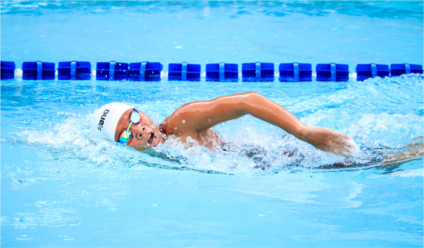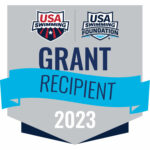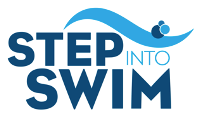Aquatics Programs

100 Mile Swim Challenge
Our swimming challenge is just the thing to keep you motivated! Swim laps, AquaWalk, or AquaJog at your own pace in the YMCA pool. Simply keep track of the laps/meters you swim during each workout and record your mileage on the tracking board with all the participants’ progress. A progress tracker with all participants will be posted weekly. Bragging rights when you complete your 100 miles! T-shirts for all participants. Top Ten Finishers get a free one-month membership and a one-month out-of-pool membership at our Peabody or Saugus locations. For every person who participates, you will also ensure that a child in need gets a free swim lesson. Feb. 1-Dec. 31, 2024.
Swim LessonsLifeguard CoursesPool ScheduleSwim Challenge
Swim Levels & Programs
ADAPTIVE SWIM
Ages 3-12 | 30 minute classes
The Y’s Adaptive swim programs are designed to give children with disabilities opportunities to participate in swim lessons while focusing on developing both physical and social skills that will last a lifetime. We emphasize each person’s abilities and individuality and specifically design a swim program to foster independence while providing positive recreational and educational experiences for our participants.
WATER SMART IS WATER SAFE
The YMCA is pleased to offer a virtual Safety Around Water program to provide swim and safety tips to fill the educational gaps while our in-person lessons are paused. While the way the Y interacts with the community we serve may look different right now, the goal to help people of all ages and backgrounds be healthy, confident and secure in the water remains the same. We miss seeing you at the Y, but we remain a strong community committed to healthy living, youth development, and social responsibility.
Ages: 6 months – age 3
Parent/Child A: (6 months – 18 months) Parents learn water safety, holds and towing techniques that encourage basic kicking/pulling and water independence for children. Swim diapers must be worn.
Parent/Child B: (19 months – 36 months w/ parent) Toddlers are introduced to submerging, kicking and pulling combinations, floating and swimming without flotation. Swim diapers must be worn for children not potty trained.
Ages: age 3 – age 6
Level 1: This class is for the child who has little or no experience. Increases comfort with underwater exploration and introduces basic self-rescue skills performed with assistance. Please bring goggles to class.
Level 2: Swimmers must swim 5 feet without assistance or flotation and fully submerge their face in the water to enter this class. Encourages forward movement in water and basic self-rescue skills performed independently. Please bring goggles to class.
Level 3: Swimmers must swim 20 feet or about three quarters the width of the pool without flotation to enter this class. Develops intermediate self-rescue skills performed at longer distances than in previous stages. This class will be taught in the deep end of the pool. Please bring goggles to class.
Level 4: Swimmers must be able to proficiently swim the width of the pool on their stomach and back without flotation to enter this class. Introduces basic stroke technique in front crawl and back crawl and reinforces water safety through treading water and elementary backstroke. This class will be taught in the deep end of the pool. Please bring goggles to class.
Ages: age 6+
Level 1/2: This class is for children with little or no experience. It increases their comfort with underwater exploration and introduces basic self-rescue skills performed with assistance. Please bring goggles to class.
Level 3: Swimmers must swim 20 feet or about three-quarters the width of the pool without flotation to enter this class. Develops intermediate self-rescue skills performed at longer distances than in previous stages. This class will be taught in the deep end of the pool. Please bring goggles to class.
Level 4: Swimmers must be able to proficiently swim the width of the pool on their stomach and back without flotation to enter this class. Introduces basic stroke technique in front crawl and back crawl and reinforces water safety through treading water and elementary backstroke. This class will be taught in the deep end of the pool. Please bring goggles to class.
Ages: age 6+
Swimmers must be able to swim the entire length of the pool with proficient front crawl and backstroke and tread water for 1 minute to enter this class. Swimmers are introduced to the four competitive swimming strokes as well as rescue skills and healthy lifestyle habits.
Level 5: Swimmers must be able to proficiently swim the width of the pool on their stomach and back without flotation to enter this class. Introduces basic stroke technique in front crawl and back crawl and reinforces water safety through treading water and elementary backstroke.
Level 6: Swimmers must be able to swim 200 yards continuously with proficient front crawl and backstroke with rudimentary breast stroke, butterfly and tread water for 2 minutes to enter this class. Please bring goggles to class.
Ages: age 17+
Adult Beginner Swim: This is the place to start for adults who don’t have a lot of prior swimming experience. Participants will become more confident in the water and will learn the fundamentals of swimming and aquatic safety.
Adult Stroke Development: Develop basic swim strokes and use swimming as a source of fitness. It is recommended that participants have taken beginner swim lessons before enrolling in stroke development.
Swim Fit (Master’s Swim): This program provides workouts for triathletes and fitness swimmers. This class will aim to meet everyone’s needs. All levels encouraged to participate.
- Classes are 30 minutes in length for both private and semi-private lessons.
- Private lessons are available to both children and adults of all skill levels. Semi-private lessons are available to up to 3 children in a group with similar swimming ability.
- Private Swim Lessons are only available for YMCA of Metro North Members.
- Private swim lessons are not guaranteed; requests are dependent on instructor availability/pool space
Fill out a Private Lessons Request Form
After a request is submitted, the branch aquatics/assistant aquatics director will follow-up by email or phone.
Learn to Dive: (age 6+) Learn to dive in head first and progress to diving off the starting block to the diving board! Participants must be able to swim the length of the pool without aide.
Springboard Diving: (age 7+) Learn the basics of competitive diving. Students will practice approaches forward and back jumps in straight, pike and tuck body positions, and forward and back dives. Participants must be able to pass the deep water test and do a forward dive from the side of the pool.
Advanced Springboard Diving: (age 11+) This class is for divers who have been promoted from the beginner class or high school divers who want to perfect their advanced skills. Instructor recommendation is required.
The YMCA of Metro North Tritons now offer a Dive Team. Learn more!
Learn more about the YMCA of Metro North Tritons Swim and Dive Team!
Babysitting and Junior Lifeguard Program: (ages 11-14) Topics for this combo class will cover first aid, choking, CPR, medical emergencies, diapering, spoon feeding, water safety and more! Digital certification available upon completion of course for both babysitting and junior lifeguarding. Participants must be able to swim 100 yards (4 lengths of the pool) to be eligible for the junior lifeguard component.
Lifeguard Bootcamp: (age 15+) This 7 week course will build up your stamina to swim 500 yards, retrieve items from the bottom of the pool, and build your strength for you to assist any size victim. Class format will be both dry land and aquatic training. Minimum requirements for class must be able to swim 25 yards and lift a minimum of 25 lbs.
Lifeguard Training: (age 15+) Students will be trained in the nationally recognized American Red Cross Lifeguard Course including CPR, First Aid, 02 and AED. Certification is determined by successful completion of a comprehensive written exam and water test. Swimming skills are a pre-requisite and attendance in all classes is mandatory.
Red Cross Lifeguard Re-Certification: (age 15+) This is a 4 hour review and testing to re-certify for American Red Cross Lifeguard, CPR/FA/AED and Optional Oxygen. Students should come to the review prepared and ready to show their skills. Certification must be current. Prior to taking this re-certification, please take the online refresher course found at www.redcrossrefresher.com. Refresher courses for both lifeguarding and CPR/AED for professional rescuers should be completed.
Discover Scuba: (age 8 – age 80) Class begins with a brief top side lesson followed by getting in the pool with an experienced instructor. All equipment is provided.
Open Water PADI Certification: (ages 10+) This class will include your entire certification and equipment for pool and open water test. Rental of wet suits available but not needed for pool time. The classroom book needed is “Open Water Diver Manual” and may be purchased individually or from the instructor the first night for an additional $55.
*Classes vary by branch, please contact your branch Welcome Center for class details and availability.
The YMCA of Metro North collaborates with multiple organizations to provide aquatics programs to all members of our community. The YMCA of Metro North is a proud partner of the The USA Swimming Foundation and Step Into Swim.



